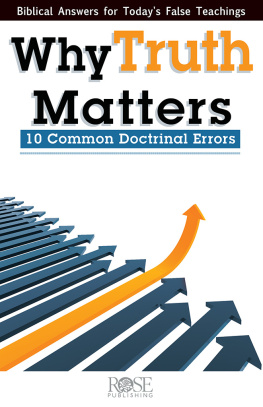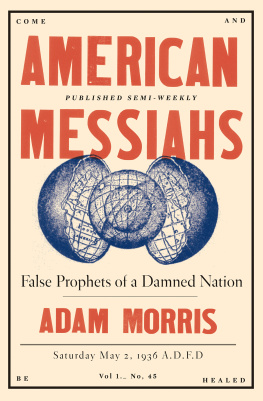FirstFirst published 1987 by Transaction Publishers
Published 2017 by Routledge
2 Park Square, Milton Park, Abingdon, Oxon OX14 4RN
711 Third Avenue, New York, NY 10017, USA
Routledge is an imprint of the Taylor & Francis Group, an informa business
Copyright 1987 by Taylor & Francis.
All rights reserved. No part of this book may be reprinted or reproduced or utilised in any form or by any electronic, mechanical, or other means, now known or hereafter invented, including photocopying and recording, or in any information storage or retrieval system, without permission in writing from the publishers.
Notice:
Product or corporate names may be trademarks or registered trademarks, and are used only for identification and explanation without intent to infringe.
Library of Congress Catalog Number: 86-30899
Library of Congress Cataloging in Publication Data
Lowenthal, Leo.
False prophets.
(Communication in society; v. 3)
Bibliography: p. Includes index.
1. Authoritarianism. 2. Authority. 3. Prejudices.
I. Title. II. Series: Lowenthal, Leo. Communication in society; v. 3 HM271.L68 1987 303.36
ISBN 0-88738-136-7
86-30899
ISBN 13: 978-1-4128-5701-7 (pbk)
YEA, THEY ARE PROPHETS OF THE DECEIT OF THEIR OWN HEART.
Jer. 23:26
Contents
Acknowledgments
Appendix I: Samples of Profascist or Anti-Semitic Statements by the Agitators Quoted in This Study
Appendix II: Bibliography of Printed Source Material
Part IV as well as the Excursus and the Afterword were translated from German into English, especially for this volume, by Theodor R. Weeks to whom I am very grateful. I also acknowledge with profound gratitude numerous editorial suggestions of Susanne Hoppmann-Lo-wenthal.
Thanks is also due to the Institute of Advanced Study at Berlin (Wis-senschaftskolleg zu Berlin) which extended generous support for the technical preparation of the manuscript of this volume.
Ideologies and ideological manifestations may be measured, or they may be understood as qualities, as meaningful structural units. Both techniques of content analysis lead the scientist to insights into the roots of social problems, in this case, of group prejudice and discrimination. This book by Leo Lowenthal and Norbert Guterman is confined to qualitative analysis. Not the frequency of the ideas, formulas, and devices to be found in agitational material, but the meaning of dema-gogy, of its techniques and appeals, its arguments and its personalities, is the theme.
Although the study employs many psychoanalytical concepts, in fact it is devoted not so much to the private physiognomy of the agi-tator as to the psychological content and significance of the agitators behavior. It seeks to cast light on the inner, and often unconscious, mechanisms at which agitation is directed. But all this must be under-stood sociologically. Though the demagogue plays upon psychologi-cal predispositions with psychological weapons, the predispositions themselves and the aims striven for are socially created.
It is only the highly developed social situation that sets our dema-gogue apart from numerous predecessors back through the centuries and millennia. Demagogy makes its appearance whenever a democratic society is threatened with internal destruction. In a general sense, its function has always been the same: to lead the masses toward goals that run counter to their basic interests. And this function accounts for the irrationality of demagogy; the psychological techniques it employs have a definite social basis.
Today, under the conditions of a highly industrialized society, con-sumption is largely determined by production even in the field of ide-ologies. Attitudes and reactive behavior are often manufactured. The people do not choose them freely but accept them under the pressure of power, real or imaginary. Study of the people themselves therefore does not suffice. The nature of the stimuli must be studied along with the reactions if we are to grasp the true significance of the phenomena of mass behavior. Otherwise, one might erroneously attribute to an underlying frame of public mind what may in fact be the product of calculated techniques of communication.
None of the specific techniques of agitation can be judged outside their political and social contexts. Their specific significance as a means of antidemocratic mass manipulation lies solely within the structural unity of the pattern this book seeks to formulate.
It is notable, for example, that the contemporary agitator, the expert propagandist who has assumed the role of leader, dwells incessantly on his own person. He portrays himself as both leader and common man. By suggesting that he too is a victim of sinister social forces, by displaying his own weakness as it were, he helps conceal from his fol-lowers the very possibility of independent thinking and autonomous decision. He sets the pattern for that most contemporary phenomenon, the deindividualized, incoherent, and fully malleable personality struc-ture into which antidemocratic forces seek to transform man.
The content of present-day demagogy is obviously empty, accidental, and entirely subordinate to manipulative considerations. Our home-grown agitators, in the absence of an American tradition of nationalistic aggressiveness, created an artificial fusion with Italian and German fascist notions. They have also borrowed from certain forms of religious revivalism, without regard to any specific content, forms that exploit such rigid stereotypes as the distinction between the damned and the saved. The modern American agitator has put these old-fashioned techniques to very good use.
Good use? the reader may well ask with some incredulity. American hatemongers are at present at a low point in influence and prestige. Even at the peak of their strength before the war, they failed to build a unified organization or to win substantial financial backing.
This is true, of course. But because the emphasis of the book is on the meaning of the phenomena under analysis, the agitator should be studied in the light of his potential effectiveness within the context of present-day society and its dynamics, rather than in terms of his immediate effectiveness. Although overt anti-Semitic agitation is at an ebb, it is important to study its content and techniques as examples of modern mass manipulation in its most sinister form.
This volume does not exaggerate the immediate importance of American demogogy, nor does it pretend to offer a photographic picture of the political realities of the day. Instead, it places under the microscope certain phenomena that may seem negligible at first sight, and by thus enlarging the most extreme and apparently unrealistic manifestations of antidemocratic behavior, it gains diagnostic insight into the latent threat against democracy.
Max Horkheimer










